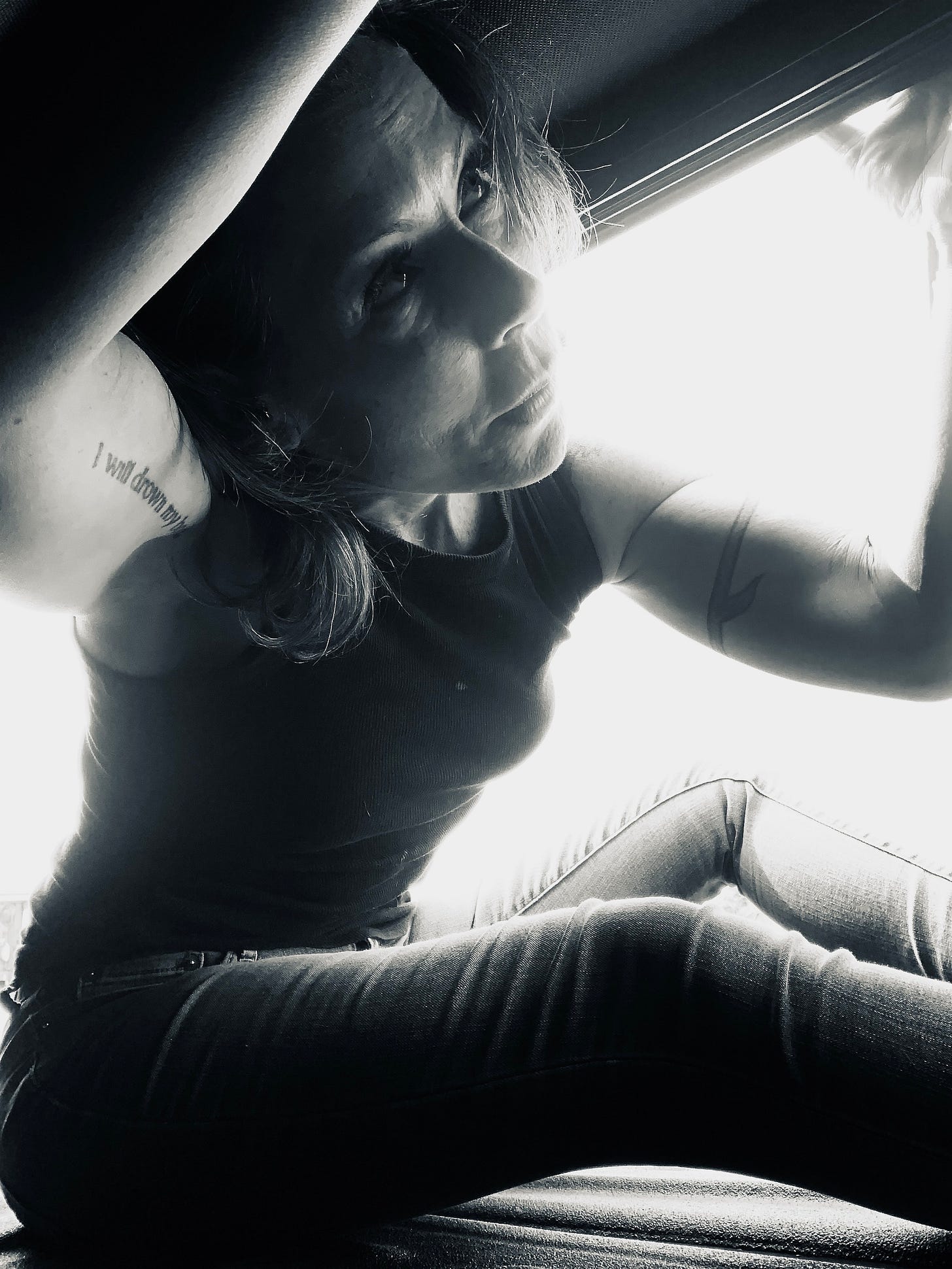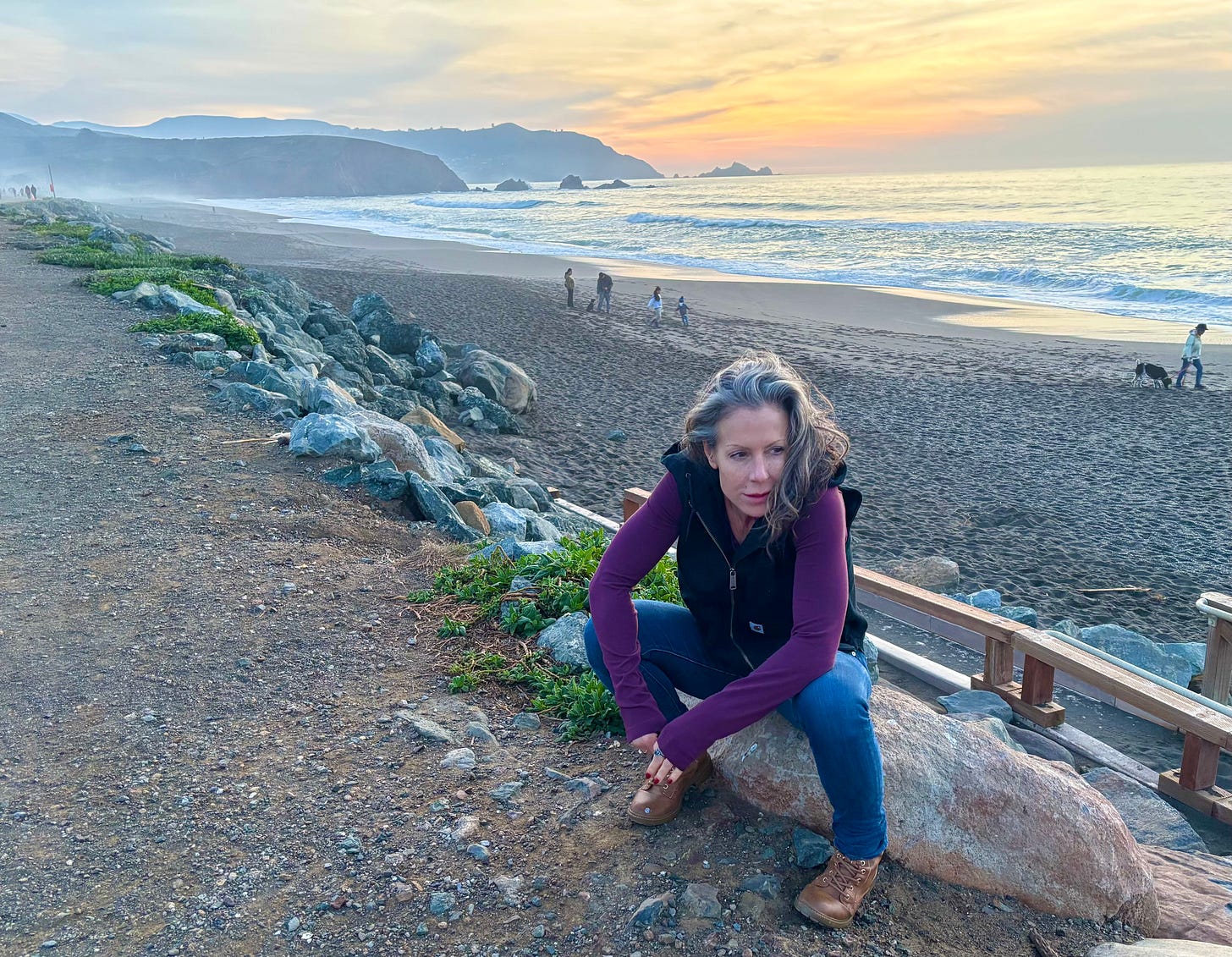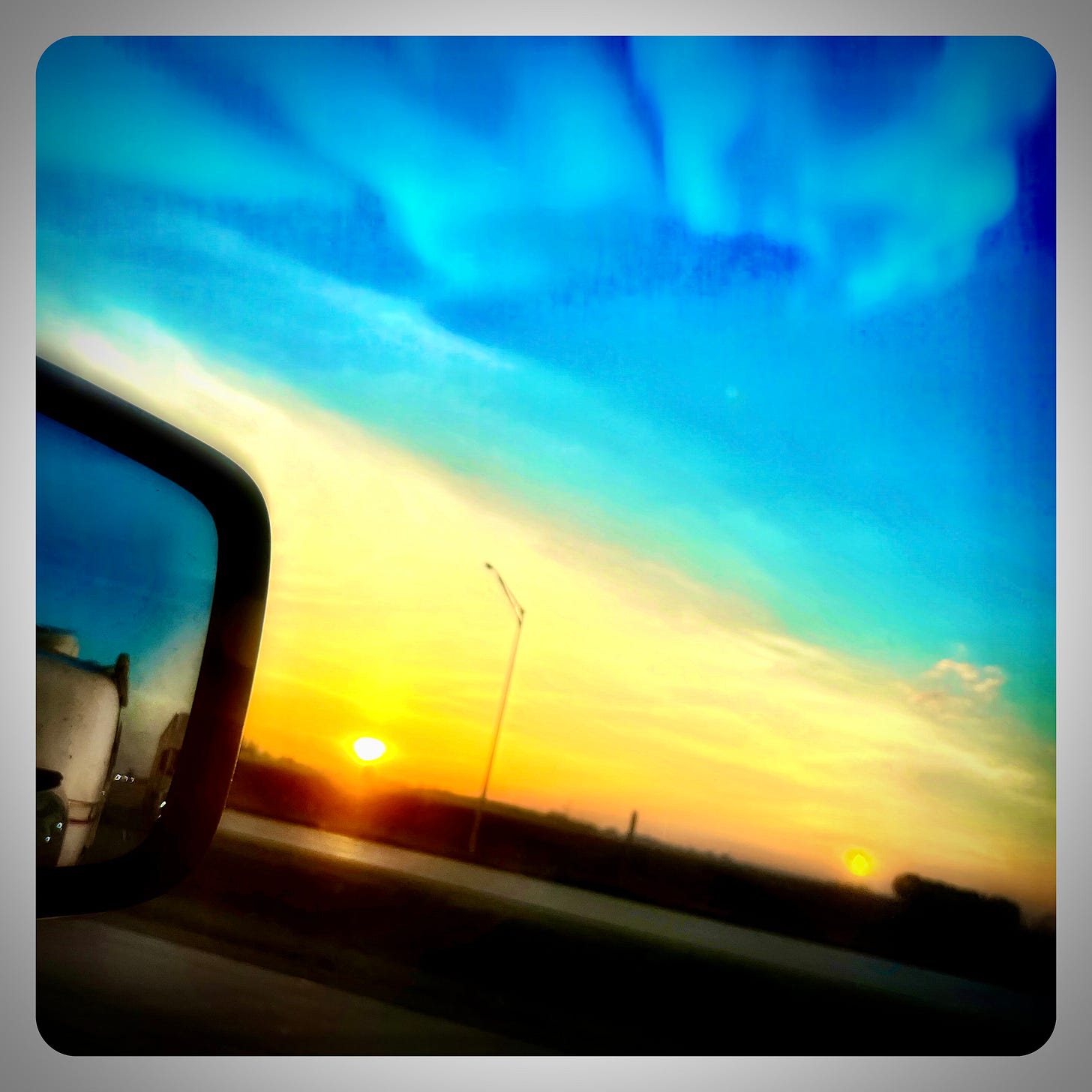Hullo, friends! Happy Friday, and welcome to the starting point of the second year of Going Solo at the End of the World. Buckle up—the world's in a Mood.
A few months back I posted the first in a series of FAQ's intended to answer a few of the questions that I (like lots of nomadic folks I know) am indeed frequently asked about road life. In that first FAQ—Tramp Scamp FAQ Vol. 1—I took a stab at the most frequently asked question of all: wtf?
Q: Are you really tall enough to drive that truck?
A: No.
Whether I answered the question of WTF or not (I did not), questions aplenty remain. They pop up in my inbox or messages or texts, they recur in conversations both casual and deep, they come up in passing or at the heart of a heart-to-heart—questions about solo life and life on the road, solitude and Scamps, trucks and tramps, writing and reporting, the country I see and the people I meet, about changing the oil and dumping the tanks and fixing a flat and keeping the wheels on the road.
Q: How often do you have to change the oil, and do you do it yourself?
A: About once a month, sometimes every two. Most of the time I do, but if I'm rolling through somewhere new, I'll take the truck into the shop so I can talk to the people I meet about their town, their work, and their lives.
When it comes to questions about the road, there are really only two kinds: people want to know how and why. The nature of the question often tells me more about the interrogator than my answer tells them about me.
Q: Don't you get lonely?
A: Oh for the love of god. We went over this last time.
The why questions arc toward the airy, the philosophical, the existential—
Q: Of all the lives you could be living, why would you choose this?
A: Of all the lives you could be living, why would you choose that?
—but they more frequently have to do with the literal, material, day-to-day reality of road life: the road IRL.
Q: Do you listen to lots of audiobooks?
A: Nope. Nor to lots of podcasts. I sing. I sing all day long, day in, day out. Sometimes I take a break from singing to make a phone call or dictate some notes or rough out a draft out loud. Then I start singing again. I believe singing to be a significant contributing factor to the overall volume of joy in my life. Are you singing enough? Have you sung your little song today? Go sing. Make a joyful noise. Sound your barbaric yawp.
Though this newsletter is just a year old, I've been on the road full time for two and a half, and even then, it was just the natural next step in a process that had long been underway.
Q: Were you scared when you started?
A: No, because I’m dumb.
The first year was brutal. The second was exhilarating, thrilling, life-changing. The third—still underway—has brought me to places I’d never been, shown me things I’ve never seen, and keeps right on unfolding into what I may have been after all along.
Q: Are you running toward or running from?
A: Isn't that a little like asking, "Are you falling into or out of love?" but more reductive and obviously cliched?
In either case, aren't you assuming that instead of people behaving like people, they behave like particles? What if I just run? What if someone just loves? Must everything have a plot? Jesus, these freaking writers.
Now, as I'm beginning to sketch out the path I’ll take in the year ahead, I can already feel the pull of possibility—the adventures and art, the things to make and discover and see, the stories to find and hear, some of which I'll tuck away for safekeeping and others I'll tell. I can’t wait to share what’s in store. For more on that, read on.
But first, a couple more FAQ’s...
Q: How can you afford to travel all the time?
A: The belief that most nomads are able to afford life on the road because they have some form of economic privilege isn't the only myth about us, but it's one of the most common. There are a lot of us, and we're very different; like any other demographic or social group, there's great variation and no representative mean. Most of us are living in something that’s a far cry from luxury. We all had our reasons for hitting the road in the first place, and we all have our reasons for continuing on. Some people set out once they accrue a measure of wealth that provides a safety net, an economic foundation, a sense of security in an otherwise fraught and fundamentally insecure way of life. Others go because they have to—maybe that foundation crumbles, maybe it was never there.
While we might have few things in common, I think it’s safe to say that many of us who travel full time didn’t plan to hit the road until the road was the only way out.
Anything can tip the domino, set a journey in motion, send a traveler on their way. You finally have enough, so you decide to hit the road, or you hit the road when there’s finally nothing left. You set out or got sprung.
You don't know, when you pull into a campground, why the person at the site down the way is crouched by their campfire warming a can over the flames. Maybe they're on vacation, roughing it, dabbling in adventure, dipping their toes into what it's like to not have enough. Maybe they just don't have enough.
But they have a can of something, and a fire to warm it, and either way, odds are, they'll glance up as you walk by, and you'll recognize something about them, and they'll recognize something about you, and it’s a connection you won’t find elsewhere, because too often, when you’re elsewhere, you forget how to listen, and you forget how to see.
Q: What is the biggest misperception about life on the road?
A: It's similar to the biggest misperception about writing or reporting (or acting or gig work of almost any kind, especially careers in the arts): that it's easy, something anyone who took half a notion could do. I can't tell you how nonplussed doctors are when they tell me they're going to write a novel when they retire, and I reply 'Oh, totally. When I get bored of real work, I'll finally be able to kick back and be a surgeon.' Similarly, full-time road life isn't a matter of downsizing a little, stocking your camper with miniature versions of all the comforts of home, and sitting with your photo-ready cup of coffee watching the picturesque sunrise while someone else does all the hitching and cranking and fixing and swearing and mopping and hoisting and punching and kicking and singing and working and working and working and then collapsing at the end of the night in a bed that's just a sheet pulled over some cushions on a plywood table, not a king or a queen or a double or even a single but a small, spare nest the length and width of a woman the size of a beach flea whose primary justification for driving a monster truck is so she can see over the other cars.
Road life IRL isn't a walk in the park. It's more of a ship out to sea with one oar and a leak. What can I tell you? You don't like the sound of screaming javelinas outside your camper in the desert in the winter in the pitch dark in the dead of night? Well, I don't like carpet. We've all got our kinks.
Q: What's the biggest difference between road life and a sticks-and-bricks life?
A: There are two things, both of which speak to the reasons I live this way, and the far more sensible reasons many others do not.
The first is an absolute absence of comfort. Nothing is easy; nothing is soft. There is no surplus of any kind—except of presence. There is a profusion, sometimes an excess of presence, of now. That's the second thing that's so different from a grounded life: here, there is no exit, no escape.
Life on the road, life on your own, affords the traveler nothing so much as silence; and in that silence, raucous and cluttered as it sometimes feels, there is a kind of spaciousness. At first it feels like emptiness; stay there long enough, you come to see it’s simply space. In that space there is the chance—one very few people are lucky enough to have, in the whole of a life—to ask questions you haven't yet asked, and wait for the answers that come on their own time.
How would you live, if you could live the way you chose, without regard to what someone else said was the right way to live, without reference to what you thought you were supposed to do or were meaning to do or thought would make you or someone else happy, without reference to some flat glossy laugh-track idea of ‘happy’ and instead with reference to your own gut sense of purpose or meaning or joy? Then how would you live? Where would you go, guided by what principle, along what course?
Those hours on the road—10, 14, 27, 33 at a stretch, sometimes—open out into something like eternity, and eternity—so far, at least—feels not like emptiness but like space; and in that space, on the road, there is this surplus of presence; and in that presence you have the chance to test the truth of everything you believe.
What have you done and left undone? Was it right or wrong? What do you mean by ‘right’ and ‘wrong,’ or do you even know? What are the lies you believed because you preferred them to the truth? Who was there when you had nowhere to go? What have you left behind when you needed to stay? Do you know yourself to be the person you claim to be? Are you still becoming the person you could yet become?
On the road, you can no more dodge the truth of yourself or the world than you can escape your own body or breath. Lord knows people try. I've tried, I still try. But failing that, and knowing down to my bones that I can run all my life and still arrive with no more and no less than myself, that I can travel anywhere in the world and I'll still have to face it, and the only way to live in and love this world is to see it clearly as it is, I've grown used to presence. It's gotten easier every mile I've gone.
And now for some big damn news.
Q: Are you writing a book about this trek?
A: I am honored, thrilled, and honestly kind of gobsmacked to say that my sixth book, SOLO, has been acquired by legendary editor and literary badass Reagan Arthur for publication in early 2027 by Grand Central/Hachette. I could not have asked for an editor or publishing house more perfectly suited to this project, and I could not be more excited to head off into the year with the glow of a most welcome deadline on the horizon.
What’s Ahead
The year ahead in Going Solo at the End of the World will bring a heap o’ new ideas, people, questions, and quests. There’ll be a series of conversations with other artists and writers including the eponymous Holly of Holly Starley’s Rolling Desk and award-winning author Karen Babine, with whom I’ll be discussing the finer and more absurd points of solo travel, road life, and Scamps leading up to the release of her third book The Allure of Elsewhere (Milkweed Books, May 2025). There will be articles and essays in newspapers and magazines that I’ll share with you, and ongoing weekly essays and audio/video reports from the north, south, east, west, and everywhere in between.
But wait—there’s more. I’m about to begin a residency in Southern California, where I’ll be writing about the social, artistic, and scientific ecology of an evolving community; there are audio and video adventures in the works, too, and I’ll be sharing some stage-, screen-, and script-related shenanigans. Next week, watch for an email announcing what’s upcoming for writers & those who know them: a full year’s schedule of writing classes (Bitchcraft Bootcamps), interactive craft talks (Lit Labs), the launch of a weekly writers’ room (the Craft Coven), and opportunities for 1:1 coaching.
This year promises to be a doozy. Wherever that greater journey leads, I’ll be glad to have your company for the ride.
Let’s Keep the Show on the Road! Anniversary Celebration
Going Solo is free to read and will stay that way, but it’s not free to create.
If you’re able to help support the independent writers, reporters, artists, and creators whose work brings something of value to your life, please know we cherish your readership and are grateful for your support.
From now until the end of December, paid subscriptions are 30% off. You can help keep the show on the road for the next year for $35—just shy of $3/month—instead of the usual $50/year.
Sadly, when the book comes out, stores won’t be giving it away. So consider throwing some change in the hat to support this work and that of other independent writers in exchange for a year of reports from the IRL road. It’ll cost you less than a book. ;)










Marya, there's so much here I want to hold. For me, this went from snort-laughing to heart-expanding. These lines:
...
Of all the lives you could be living, why would you choose that?
[B]ecause too often, when you’re elsewhere, you forget how to listen, and you forget how to see.
There is no surplus of any kind—except of presence.
...
Wild applause for the forthcoming book and all the fabulous projects. I'm especially stoked to see that you are interviewing Holly Starley and when you and your mom were reading Dylan Thomas, it was your writing and Holly's that came most to mind. I can't wait to be part of the unfolding!
"Bitchcraft Bootcamp" :)
I'm a guy. I'd go.